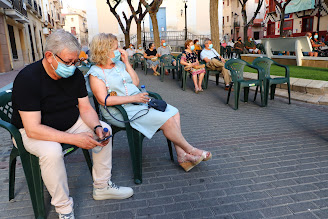Pinoso is a small town. Just under 8,000 inhabitants. Over the time of the Covid alert there have been 68 cases with 40 of them being reported in the 14 days to 14th September. As it's now the 16th the figures are lagging behind the reality. Today, for instance, there is news of a pupil at one of the local junior schools testing positive so that the whole class is now in quarantine.
In the week beginning 10th August there were no reported cases in Pinoso, week beginning the 17th August just 2 cases, 24th 6 cases, 31st 17 cases and the 7th to 13th September 39 cases. The progression is obvious enough.
The figure that seems to be being used to compare how bad things are is the number of cases per 100,000. My sums convert 68 cases in a population of 7,966 to 853 in 100,000 with that number having increased by 502 in the last fortnight. The town which borders Pinoso is Monóvar and their cumulative figure since the start of the pandemic is 221 cases per 100,000. The big difference is that, in the last couple of weeks, their numbers have risen by just 3 cases. Monóvar is also substantially bigger with a population of just over 12,000 people. Mind you a bigger town over the border into Murcia, Jumilla, was closed down last week because of the increase in infections there.
Today, the 16th September, the national average for Spain is 281 cases per 100,000 population. The equivalent figure for the UK is 55 per 100,000. Bolton, which is I understand the hot spot in the UK, has 196 cases per 100,000. Obviously all these figures are a bit dodgy in the sense that I may not be using them properly, that they are dependant on the different percentage of tests amongst a population, that there are different reporting cycles and heaven knows what other unknowns of statistical trickery. The point is obvious enough though; Pinoso is not doing so well at the moment.
You may remember that the Spanish Government wanted to extend the state of alarm a couple of weeks more but they are a minority government and they couldn't reach a consensus with the opposition parties. Rather than lose a vote they gave way and let the emergency controls lapse. Since then the controls have been in the hands of the regional governments. One of the most often quoted reasons for Spain being in its current pickle is that the State of Alarm was ended too early and that the de-escalation was piecemeal.
During the State of Alarm, when we had to stay at home, the local mayor, the head of nursing services in our health centre and the chief of the local police did a weekly "fireside chat" on the local radio. Those talks were discontinued when the state of alarm was lifted but the triumvirate was back on the radio this week. They sounded more concerned this time than they did when the hospitals were overwhelmed and the death toll was high. Then it was "together we can beat this thing", "Pinoso is responding magnificently," etc. This week's report had a clear subtext that we were on the verge of disaster because most of us were not taking it seriously any more, that we were meeting who we liked and being lax about hand washing, disinfection, keeping our distance, wearing masks and particularly that lots of us were presuming that our friends were somehow safer than strangers. The tone was very much of a strong telling off - get your act together now or suffer the consequences.
It could be an interesting few days to come.















